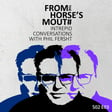Podcast Introduction with Phil First
00:00:12
Speaker
You're listening to From the Horse's Mouth, intrepid conversations with Phil First, ready to meet the disruptors who are guiding us to the new great utopia by reshaping our world and pushing past corporate spin for honest conversations about the future impact of current and emerging technologies. Tune in now.
Guest Introduction: John Hagel III
00:00:34
Speaker
We're honored today to be blessed with the presence of John Hagel III. I remember when John came to head up the, I think it was the EDGE Center, and he was a very um eminent thought leader in technology. I think you went to McKinsey, Deloitte, and a lot of your own. foolish so and Maybe, John, you could just give a little talk about your background as well.
John Hagel's Career Journey
00:00:58
Speaker
Well, how many hours do we have? now I've been in Silicon Valley now for 44 years. I was an entrepreneur, started two tech companies. I was a senior executive with Atari and the video game business for those who can remember that far back.
00:01:16
Speaker
partner with McKinsey & Company for 16 years and helped set up their Silicon Valley office. And then as was mentioned, I was with Deloitte for 17 years and founded and led a research center called the Center for the Edge. And now moving on to a new chapter in my career. On the side, I've written eight books, so I'm a obsessive writer. Wonderful. Yeah, I will write a book one of these days, but when I stop running a company, so I'll look forward to that. and so Thanks for joining me,
Evolution of Technology: AI & Digital Transformation
00:01:51
Speaker
John. Let's start with, where would you sum up today?
00:01:55
Speaker
from a technology perspective compared to the last four decades that you've experienced it, maybe change or put a glacial change at some point, maybe rapid change. How would you describe today and the last couple of years of development with our industry as we look at AI, look at autonomous computer, there and we look at some of the ventures into the cloud coming out of the pandemic? Where would you say we are?
00:02:20
Speaker
I believe we're still in the early stages of exponential change. Everybody's kind of consumed with AI these days. It seems like nobody can give a talk in technology without talking about AI. And it's important, no question about it. It's one of the key catalysts for change. But there are many other elements in digital technology that are also going to transform our lives. So, and I think in general, my experiences, the technology advances far more rapidly than we humans advance. I mean, we're rambling to catch up and find ways to actually use the technology. It takes time for us to absorb what the potential is.
00:03:03
Speaker
Would you say that the shift we're getting to right now is potentially a seismic as we went through in the 19th with the onset of the web and businesses trying to get online? Is this as big as that, do you think? Or do you think backwards they're profound big changes of the last generation?
Exponential Technological Change
00:03:21
Speaker
No, I think it's all connected. I mean, obviously the platforms, networks, access to digital ah information becomes critical for the use of artificial intelligence and that's still advancing. And I think things like quantum computing, I mean, we're still at an early stage in quantum computing. So there's a lot of technologies that come together in ways that reinforce and amplify each other. But I definitely think there is truly profound change ahead.
Opportunities vs. Fear in Tech Transformation
00:03:53
Speaker
it It's the internet. But what drives profound change? I mean, I look back to the and internet and there was a burning platform. Like if you couldn't get your business online and your employees figuring out how to work in an online environment, make you were out of business. Whereas with Gen AI, for example, and chat GPT and the elements there, I feel we're still lacking kind of the burning platform.
00:04:17
Speaker
That shows like a trigger that burning platform changes and how do you think there'll be a brand new car home that comes along that forces somebody's change that have to pass there. Wow well you just hit on something pretty critical of it people use the metaphor of the burning platform as the way to drive change and that's by appealing to fear.
00:04:40
Speaker
You know, if you don't do this, you're going to die here. It can be a motivator, but to me, the biggest and most profound motivation is the opportunities that are being created that could not be addressed without this technology. And I think ultimately that's what drove the transformation driven by the internet was at least some people saw the opportunity that was available and were driving the change.
Overcoming Fear in Tech Adoption
00:05:05
Speaker
Ultimately it's seeing the opportunity and really.
00:05:09
Speaker
recognizing that it's going to require some fundamental change to address. Yeah. So we just completed a study of about 600 global 2000 organizations. And these were decision makers and technology and solutions. And only 15% of them said they were excited by the onset of AI solutions at that they're seeing in the industry right now. A lot of them said they were struggling with things and you training me and that sort of thing. What do you think is the problem here? Isn't it that people just don't see the opportunity? Are they so set in their way? I mean, I'm trying to figure this out, but I'm not going to hear your view on this. Well, it was part of the focus of my most recent book, The Journey Beyond Fear. But my experience, and I've worked as an advisor, consultant to senior leaders of large organizations around the world,
00:06:02
Speaker
I'm struck by the extent to which they are dominated by fear, the emotion of fear.
From Scalable Efficiency to Scalable Learning
00:06:08
Speaker
And if you're ah afraid, you just want to hold on to what you have. Just squeeze harder and hold your breath and sooner or later you'll make it through, but don't get distracted or take risks with all this new technology stuff that's out there. And so I think that's in my experience, a key factor that's holding people back from aggressively adopting these technologies and finding ways to to use them. And you've come out of years in Silicon Valley with these massive consulting firms where you find CIOs, et cetera, for years around adopting technology and adapting to change the future work and that sort of thing.
00:06:52
Speaker
How would you describe the pace of change in enterprises? Because at HFS, we're continually frustrated that some businesses still run their processes like they were after for the second law. Businesses are still dependent on legacy technology, legacy ERP that requires armies of about consultants to help them figure things out. right why why Do you think enterprises are going to get away from like carrying this sort of technical debt and really start to shift towards more of an opportunistic mindset?
00:07:27
Speaker
Yes, well, I'm an optimist by nature and I believe partly because I've seen this happen in digital technology Silicon Valley for decades. So there is this process initially of dismissal and resistance and avoidance and over time as.
00:07:43
Speaker
more risk-taking entrepreneurial companies demonstrate the potential and and power of the technology. It motivates people to overcome their fear and find ways to either adopt it or they continue to be resistant and good luck, they're gone sooner or later. I've written a lot about what I call the big shift I believe we're in the early stages of a shift in many dimensions of our work and lives. And it starts with the notion of institutional models. And you mentioned, we'd go back to world war two. I believe that actually most of our large organizations around the world are driven by an institutional model that started in the early 20th century. I call it the scalable efficiency model.
00:08:34
Speaker
The key to success is to continue to be more and more efficient at scale that's the key to success and for over a century it's led to huge success all the huge organizations we have around the world are driven by scalable efficiency.
00:08:52
Speaker
But the focus is just about how do we cut costs the problem with scalable efficiency and i actually started my career i didn't mention this but with boston consulting group. And they launched with an analysis that they called the experience curve which showed how performance is improving overtime and it's a diminishing returns curve.
00:09:16
Speaker
the more costs you cut, the longer and harder you have to work to cut the next increment of costs. It's a diminishing returns gain. I believe because of all the technologies that we're developing, artificial intelligence being one of them, that we need to shift to a different institutional model. I call it scalable learning, where the focus Is for everyone in the organization to learn faster and by the way i should clarify. Because when i talk about learning to executives they say oh you mean training programs no. That's learning in the form of sharing existing knowledge not to dismiss that but in a rapidly changing world existing knowledge is becoming obsolete at an accelerating rate.
00:10:04
Speaker
Learning that's gonna be most necessary and valuable in this new world and scalable learning is learning in the form of creating entirely new knowledge that never existed before i can fronting situations that have never been confronted before. Executives today would say oh we do that in research and development units or innovation labs.
00:10:25
Speaker
No, scalable learning says every employee in the organization should be focused on scalable learning. How can they learn faster in the form of creating new knowledge by confronting unexpected situations to create more value to the stakeholders? Not just cut costs, but create more value. I believe that one of the interesting things about this new world and the big shift is it creates exponentially expanding opportunity. We can create far more value with far less resources far more quickly than would have ever been imaginable several decades ago. But that requires scalable learning. It requires people who are driven to find ways to create that value and exponentially increase their impact.
00:11:16
Speaker
What is preventing us from getting there?
Redefining Work for Creativity
00:11:19
Speaker
I mean, I think pandemic was a tremendous exercise. I thought it brought a lot of people together, but then at the same time, it changed how we worked. And now companies are trying to piece together how we used to be a little bit. We're the bit of where we're going. In my own company, we're opening a new office in Boston, and we're completely hybrid. But people are shocked that we're opening a new office. They're like, what are you doing?
00:11:42
Speaker
I've got a team of analysts. They're just going to sit and go stale. You can't get them in your room together. and We need to learn from each other. You can't all sit at home in our little cocoons staring at each other through Google chat or whatever we're using and learn. So how do you think we go from where we come from to a culture of scalable learning and this endless new mindset that you're talking about, John?
00:12:06
Speaker
No, I don't want to suggest it's easy. It's going to be very challenging because it requires us to challenge and question all the conventional approaches to how we manage organizations. I think that the way we define work in a scalable efficiency environment is everyone does their assigned tasks that are specified in great detail and they perform them reliably and efficiently.
00:12:33
Speaker
That's what all work is throughout the organization. The challenge is, if that's what work is, we as human beings are not very good at that kind of work. The machine can do that work so much better than we can. And the interesting thing is when I talk to executives about artificial intelligence and is digital technology, they have two questions that they ask me. One is, how quickly can I automate?
00:13:02
Speaker
And how many jobs can I eliminate? Again, scalable efficiency. It's all about cutting costs, get rid of people wherever I can, use the technology to do that. The opportunity, the question they should be asking is, as these people free up their time, as they're no longer having to focus on these routine tasks, what could they do to learn and create much more value in whatever environment they're in, in the corporation?
00:13:29
Speaker
And it now frees us up. I make the observation that technology is actually going to restore our humanity. We have not been operating as human beings in large organizations for over a century. And I think the good news is again, technology is going to allow us to free ourselves up and focus on the things that can be done. Again, I don't want to say this is easy because it it does challenge the most basic assumptions. What is work?
00:13:59
Speaker
Really, we have to redefine what work is. It's challenging, but I think that we'll see early examples where work is being done. I'll give you an interesting example. I can't name the company, unfortunately. So I worked with them, but it was a clinical laboratory company and their call center operations, they were facing a problem that their customers were getting more and more unhappy with the support they were getting.
00:14:26
Speaker
and the customer call center operators were becoming more frustrated and leaving at a rapid rate on their work. The head of the department went to the workers, called them all together and said, number one, I'm going to guarantee nobody's going to get fired. None of you will be fired. But number two, you need to work with the technology department to find out how you can automate as much of the questions, the routine questions that you're consuming or answering.
00:14:54
Speaker
and Then, when you free up your time, identify the really hard questions that nobody's really coming up with a good answer on. Within a few months, customer satisfaction went way up, employee satisfaction went way up because they were finally making a difference that was meaningful that nobody else could do because it wasn't just in a manual somewhere.
00:15:17
Speaker
And so I think it was an interesting example of demonstrating in one part of an organization what this could do. I love what you said about no one's getting fired.
Automation and Job Security Concerns
00:15:28
Speaker
I think that as a significance, I mean, in terms of a study I mentioned earlier, I think 15% were infused with NI, 65% were worried about their jobs. And I actually think it's this fear that You have a company which is all about coming cost, and if you become a cost, you're out of here, and that is preventing people from actually automating some of the work they do. We've been having sessions with our analysts where we've actually, they're all using VOD, CCTP, these different
00:16:02
Speaker
apps to help them with their research. And I've actually got them to do presentations through each other or how they're using these tools. They're analysts, so they can get information faster. They're a bit smarter as they're doing. But getting them to share with each other has been really powerful. If you've got a culture where people aren't scared, and then you get them to experiment, I think you really hit the man on the head there, John, with maybe do some of the things that we have to do moving forward. Because I think a lot of people are scared right now.
00:16:30
Speaker
We've got to get away from this culture of cost reduction and move it more to productivity. Productivity is about, as you said, get more out of what you've got. Gail with what we have, not just trying to do more with less, which is ultimately firing people. So I'm really buying today.
Building Adaptability: Curiosity & Creativity
00:16:48
Speaker
How do you think the world's going to look in the workplace in 2020, 2018?
00:16:53
Speaker
Wow, I'm not sure all the workplaces will look this way in 2028, but certainly more will. i I do believe, again, it's a big shift and everything changes. One of the shifts that I see is, again, when I talk about learning, executives talk about skills. Okay. We need to re-skill. Everybody needs to acquire new skills.
00:17:16
Speaker
The issue for me and this could be just semantics or language but when i think of skills those are things that are valuable in a specific context. How to operate this machine in this factory how to do this kind of calculation in this process those are important skills and yes people can develop them but the challenge again is that skills are becoming obsolete at an accelerating rate.
00:17:42
Speaker
I think that what we need is to shift our focus to what I call capabilities, which are things that are valuable in all contexts, not just in a specific factory or a specific process, but in all contexts. And when I talk about capabilities, what I'm talking about is curiosity.
00:18:02
Speaker
collaboration, imagination, creativity, reflection. All of those I think are extraordinarily helpful and powerful in driving this new form of learning and creating new knowledge.
00:18:17
Speaker
And yet there's very little emphasis or focus on how to cultivate these capabilities. And frankly, the cultures that we have, the work cultures that we have are very hostile to these capabilities. Curiosity. Come on. You're asking too many questions. Just read the manual and follow the manual. You don't have to ask questions. For your imagination, you're deviating from the script. Don't deviate from the script. Just follow the manual.
00:18:46
Speaker
And so it's hostility to these capabilities versus recognizing no these are absolutely essential for everyone in the organization. To really cultivate and how can we create environments that will help them to do that. I believe that today the mark of a strong leader is someone who has an answer to all the questions.
00:19:08
Speaker
No matter what question you can count on the leader to have an answer. By the way, if they don't, maybe it's time to get rid of them and get somebody who does. I believe that's why trust is eroding in all of our large institutions. We have leaders who say they have the answers to all the questions.
00:19:26
Speaker
Two possibilities one they have no idea how rapidly the world is changing or two they're lying in either case i don't trust them my belief in this big shift world is the mark of a strong leader in the future is someone who has the most powerful and inspiring questions.
00:19:45
Speaker
and who will freely admit they don't have an answer and ask for help. And that sets an entirely different culture in the organization where it's not only okay to ask questions, it's absolutely necessary.
Conclusion: Embracing Technological Change
00:19:58
Speaker
It's not only okay to ask for help, it's absolutely essential to ask for help. But I believe that the technology can be a huge catalyst for the changes that we're going to see.
00:20:10
Speaker
I really look forward to sharing this conversation. John, I think it's actually critical and I really appreciate your thoughts that I really thank you for your time. I appreciate the interest for sure.
00:20:26
Speaker
Thanks for tuning in to From the Horse's Mouth. Intrepid conversations with Phil first. Remember to follow Phil on LinkedIn and subscribe and like on YouTube, Apple Podcasts, Spotify or your favourite platform for no-nonsense takes on the intricate dance between technology, business and ideological systems. Got something to add to the discussion? Let's have it. Drop us a line at fromthehorsesmouthathfsresearch.com or connect with Phil on LinkedIn.















